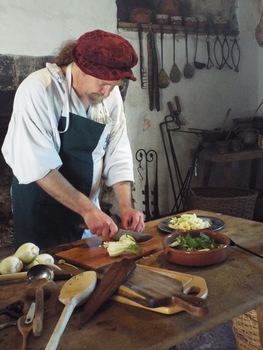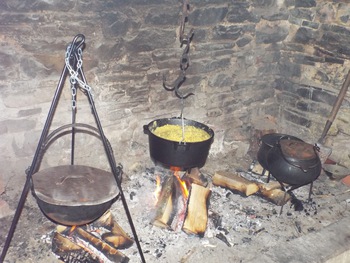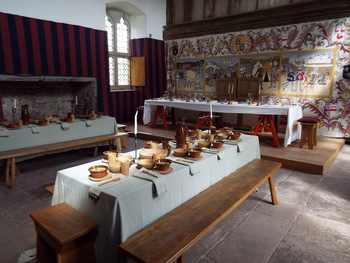|
Previous Entry
First Entry
|
At The Mark, Feast Recipes and Post Mortem
At The Mark has come and gone, and a lovely time was had by all. Or at least,
I had a lovely time since I was in the kitchen at the beautiful
Tretower Court and I assume other people had a good time, too.
 For this feast, I made the decision, prompted partly by some spice allergies
that afflicted the diners, to go easy on the spicing, and instead to provide
salt, poudre fort, and poudre douce on the table, and let people apply the
spices to their own taste - guided, of course, by the recipes themselves.
I used the same poudre fort mixture as I used at
Flaming Arrow,
and which I used for this feast in the mylaches of pork. For poudre douce, I went for a simple sugar and cinnamon mix.
For this feast, I made the decision, prompted partly by some spice allergies
that afflicted the diners, to go easy on the spicing, and instead to provide
salt, poudre fort, and poudre douce on the table, and let people apply the
spices to their own taste - guided, of course, by the recipes themselves.
I used the same poudre fort mixture as I used at
Flaming Arrow,
and which I used for this feast in the mylaches of pork. For poudre douce, I went for a simple sugar and cinnamon mix.
- Poudre Fort: Two parts of black pepper, to one part each clove and ginger
- Poudre Douce: Three parts sugar to one part cinnamon
For the feast itself, the bulk of the recipes are from:
- Hieatt, Constance B. and Sharon Butler. Curye on Inglysch : English Culinary Manuscripts of the Fourteenth Century (Including the Forme of Cury). Early English Text Society. Supplementary Series. Vol. 8. London: Early English Text Society, 1985.
The recipe citations are page number and recipe number.
-
To make blaunche porre. Tak whyte lekys & perboyle hem & hewe hem smale with oynouns. Cast it in good broþ & seþ it vp with smale bryddys. Coloure it with safferoun; powdur yt with pouder douce.
- Curye on Inglysch, Forme of Cury, p. 98, #12
I started by roasting off three chickens with a little salt and nothing else.
When they were done and cooled, the meat was stripped off the bones, bagged
and frozen. The drippings and such went into a jar to serve as stock.
On the day, five or six leeks (whites and greens, because even though it should be white - blaunche, after all - I can't make myself discard the green part of the leek)
and a couple of onions went into a pot with the broth, some water, and a
bit of salt. When it was hot, the chicken was added, and the whole thing
was brought back up to temperature.
Saffron was omitted for reasons of economy. Poudre douce on the table.
-
- Malaches of pork. Hewe Pork al to pecys and medle it with ayren & chese igrated. Do þerto powdour fort safroun & pynes with salt. Make a crust in a trap; bake it wel þerinne, and serue it forth.
- Curye on Inglysch, Forme of Cury, p. 134, #162
For the feast, I again omitted the saffron. I made a crust, not pastry, but more of a pizza dough. I use a ratio of 14 eggs, 1 kg of cheese and 1 kg of pork mince, 1 Tbs of salt, and 2 Tbs of poudre fort (see above). There
were no pine nuts, because I forget to buy any. I cooked them ahead, and
froze them.
-
Frenche iowtes. Take and seeþ white pesoun and take oute þe perrey; & perboile erbis & hew hem grete, & cast hem in a pot with the perry. Pulle oynouns & seeþ hem hole wel in water, & do hem to þe perry with oile & salt; colour it with safroun & messe it, and cast þereon powdour douce.
-
Curye on Inglysch, Forme of Cury, p. 115, #75
I used both green and yellow split peas, since they were the easiest to come by. I boiled them until they were cooked, then set them aside and froze them.
On the day of the feast, an onion, and some bunch of cabbage and spring greens were put
in the pot after the peas had thawed. I added a bit of salt, but I don't think I added
any oil. I probably meant to, but the pot was nearly overflowing.
Poudre douce was on the table for people to apply to their own taste.
This was probably the surprise hit of the feast. Something about the way the cabbage and
peas interacted was magical. I served high table first, and gave the Prince a portion
before serving anyone else. By the time I was about to move on to the next table, he
was asking for seconds.
This was also the hardest to cook properly. The other pottages
were liquid enough that burning on the bottom wasn't really an issue. I had to be careful
with this one and serve from the top.
-
Erbolat. Take persel, myntes, sauery & sauge, tansey, veruayn, clarry, rewe, ditayn, fenel, southrenwode; hewe hem & grinde hem smale. Medle hem vp with ayren. Do buttur in a trap, & do þe fars þerto, & bake it & mess forth.
-
Curye on Inglysch, Forme of Cury, p. 138, #180
This was used as inspiration, honestly, rather than strict redaction - only partly due to the difficulty and expense of acquiring large quantities of some of the listed herbs and greens.
I made a wide variety of erbolats. High table had a decorate pie with endive and land cress.
The rest were essentially cabbage and spring greens, eggs, and salt. (With some leftover cress and endive from the high table pie.) I used a little olive oil rather than butter to avoid any dairy issues. For the crust, I again went with more of a pizza dough.
 These were a little problematical. I liked the flavour of the result, but they weren't to
everyone's taste. They also didn't thaw completely, which didn't help sell them to the
crowd. The difficulty was in the crust/egg interaction. I blind-baked the crust a bit, but
I couldn't use it as flat base in the way I could for the malaches; the egg simply ran off.
I still liked the outcome, but the amount of egg was minimal. The solution, of course,
was to raise the edge of the crust, so the egg wouldn't run out. More experimentation is
needed. I might need to rerun these, tweaking the variables a bit.
These were a little problematical. I liked the flavour of the result, but they weren't to
everyone's taste. They also didn't thaw completely, which didn't help sell them to the
crowd. The difficulty was in the crust/egg interaction. I blind-baked the crust a bit, but
I couldn't use it as flat base in the way I could for the malaches; the egg simply ran off.
I still liked the outcome, but the amount of egg was minimal. The solution, of course,
was to raise the edge of the crust, so the egg wouldn't run out. More experimentation is
needed. I might need to rerun these, tweaking the variables a bit.
-
Fenkel in soppes. Take blades of fenkel; shrede hem not to smale. Do hem to seeþe in water and oile, and oynouns mynced þerwith; do þerto safroun and salt and powdour douce. Serue it forth. Take brede ytosted and lay the sewe onoward.
-
Curye on Inglysch, Forme of Cury, p. 115, #79
Fennel, olive oil, onions, salt, ginger, and water in a pot. Poudre douce on the table.
I didn't have time to toast bread, so no soppes per se. Excellent if you like fennel, terrible
if you don't. The leftovers were poured into the blaunche porree, and the combination
was delicious at home the next day.
-
Chyches. Take chiches and wrye hem in askes al nyȝt oþer al a day, oþer lay hem in hoot aymers. At morowe waische hem in clene water, and do hem ouere the fire with clene water. Seeþe hem vp and do þerto oyle, garlek hole, safroun, powdour fort and salt; seeþe it and messe it forth.
-
Curye on Inglysch, Forme of Cury, p. 114, #73
Not much to say here. I used canned chickpeas to simplify the preparation. I think I might
have left the pepper out, due to allergies. Otherwise, salt, cumin, garlic, and a little oil.
I went with cumin here because it works so well with chickpeas. There's a recipe in Apicius
with that combination. I used that recipe in a feast over a decade ago.
-
Charlet. Take pork and seeþ it wel. Hewe it smale; cast it in a panne. Breke ayren and do þerto cowe mylke and safroun, and boile it togyder. Salt it & messe it forth.
-
Curye on Inglysch, Forme of Cury, p. 107, #41
Half a kilo of pork mince, half a dozen or so eggs, a good glug or two of milk, and (probably a hair too much) salt. Saffron was omitted as before. Because of the limitations of the kitchen and my kit, I cooked the pork mince with a bit oil in the skillet, then added the rest.
It came out like scrambled eggs with pork in it. Not bad at all.
-
Compost. Take rote of persel, of pasternak, of rafens, scrape hem and waische hem clene. Take rapes & caboches, ypared and icorue. Take an erthen panne with clene water & set it on the fire; cast all þise þerinne. Whan þey buth boiled cast þereto peeres, & perboile hem wel. Take all þise thynges vp & lat it kele on a faire cloth. Do þerto salt; whan it is colde, do hit in a vessel; take vyneger & powdour & safroun & do þerto, & lat alle þise thynges lye þerin al nyȝt, oþer al day. Take wyne greke & hony, clarified togider; take lumbarde mustard & raisouns coraunce, al hoole, & grynded powdour of canel, powdour douce & aneys hole, & fennel seed. Take alle þise thynges & cast togyder in a pot of erthe, & take þerof whan þou wilt & serue forth.
-
Curye on Inglysch, Forme of Cury, p. 120-121, #103
Here I used a selection of the rather extensive list of ingredients rather than try to get them all. Carrots, parsnips, and cabbages were
the base, and a few under-ripe pears from the backyard. Salt and something we had sitting around calling itself 'apple balsamic vinegar' which is just cider vinegar with apple juice added back in.
It's sweet enough that I decided to do without 'wyne greke' and honey.
The vegetables were parboiled, salted, and set to steep in the vinegar over night and on the trip down.
In the morning I added currants, a few tablespoonsful of prepared mustard, cinnamon, and that was about it. It steeped in an earthenware
crock until being served.
We liked it well enough, and have been eating the leftovers at home.

-
Salat. Take persel, sawge, grene garlec, chiboles, oynouns, leek, borage, myntes, porrettes, fenel, and toun cressis, rew, rosemarye, purslarye; laue and waische hem clene. Pike hem. Pluk hem small wiþ þyn honde, and mynge hem wel with rawe oile; lay on vyneger and salt, and serue it forth.
-
Curye on Inglysch, Forme of Cury, p. 115, #78
Rather than trying to track down all the various herbs and greens mentioned, I just went with a few mixed greens, and spring onions. The dressing was olive oil, red wine vinegar, and salt. A dish was served undressed for those that prefer it that way.
-
Savillum hoc modo facito: Farinae selibram, casei P. II S una commisceto quasi libum, addito mellis P. [1/4] et ovum unum. Catinum fictile oleo unguito. Ubi omnia bene commiscueris, in catinum indito, catinum testo operito. Videto ut bene percocas medio, ubi altissimum est. Ubi, coctum erit, catinum eximito, melle unguito, papaver infriato, sub testum subde paulisper, postea eximito. Ita pone cum catillo et lingula.
Make a savillum thus: Mix 1/2 libra of flour and 2 1/2 librae of cheese, as is done for libum. Add 1/4 libra of honey and 1 egg. Grease an earthenware bowl with oil. When you have mixed the ingredients well, pour into the bowl and cover the bowl with an earthenware testo. See that you cook it well in the middle, where it is highest. When it is cooked, remove the bowl, spread with honey, sprinkle with poppy, put it back beneath the testo for a moment, and then remove. Serve it thus with a plate and spoon.
-
A Taste of Ancient Rome, Ilaria Gozzini Giacosa, trans. Anna Herklotz. University of Chicago Press, 1992, p. 163. (Original source is Cato, c. 180 BC)
My version is roughly:
- 1 cup flour
- 1 kg ricotta cheese
- 1/2 cup honey plus more to drizzle on
- 1 egg
- poppy seeds
- olive oil to grease baking dish
Mix ingredients well, put into a lightly greased baking dish. Bake at 160C or 170C for 50 - 60 minutes, until set. Lightly score the top with a sharp knife, drizzle with
a bit more honey and sprinkle lightly with poppy seeds. I served it cold with a little honey on the platter for dipping.
I've already started to think about what I could tweak the next time I'm in there. I think I could do roasts, but rather than spit-roast
them, I could do them in one of the dutch ovens. Overall, I was fairly pleased.
Photos courtesy of Ellen Rawson. The photo of the hall is as it was set by
the staff at Tretower. We struck all of their tableware and people used their
own feast gear as per SCA standard.
|
Next Entry
Latest Entry
|
![Smashy the Hammer hates cell phones [Smashy the Hammer]](/hammer.gif)
![Of course there is mouseover text, because, hey, aspiring. [An Aspiring Luddite]](/Luddite2.gif)
![I am looking at my off-camera
bass guitar [Jeff Berry]](/file.jpg)


